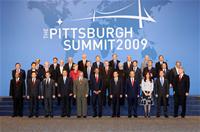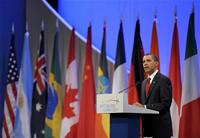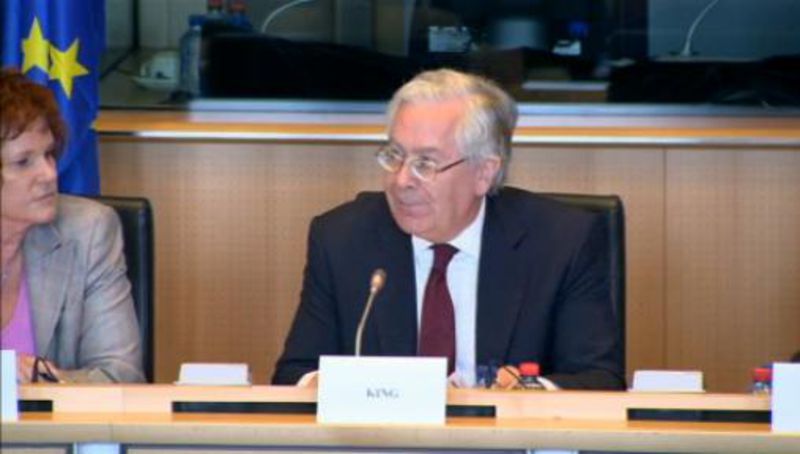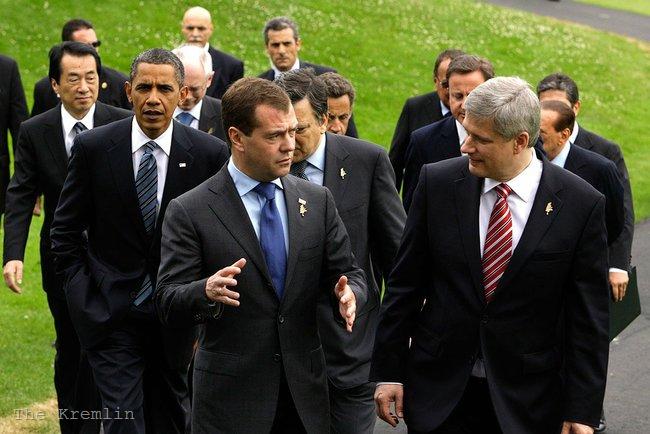There no longer be G8 - the G20 is the new global economic format
Adelina Marini, September 26, 2009
 G20 is the new and most important forum for international cooperation. This is what the leaders of the Twenty have decided on their summit in Pittsburgh yesterday. But with this the concrete decisions run out. However, the decision the G20 to replace the current G8 format, in which the most developed industrialized countries + Russia participated, is a right step towards better reflection of global realities. Because from now on representation in the group and a word in world activities will have not only the richest countries but also Argentina, Brazil, China, India, Indonesia, Mexico, Saudi Arabia, South Africa, South Korea, Turkey and, maybe most important for is - the EU as an entity. I say as an entity because, beside as an entity the Union is represented separately by some of its members - France, Germany, Italy and Britain.
G20 is the new and most important forum for international cooperation. This is what the leaders of the Twenty have decided on their summit in Pittsburgh yesterday. But with this the concrete decisions run out. However, the decision the G20 to replace the current G8 format, in which the most developed industrialized countries + Russia participated, is a right step towards better reflection of global realities. Because from now on representation in the group and a word in world activities will have not only the richest countries but also Argentina, Brazil, China, India, Indonesia, Mexico, Saudi Arabia, South Africa, South Korea, Turkey and, maybe most important for is - the EU as an entity. I say as an entity because, beside as an entity the Union is represented separately by some of its members - France, Germany, Italy and Britain.
But it is worth mentioning that G20 members will not be equally represented as the member of the G8 were. The reasons is, that according to the deal at Pittsburgh, the members of the Twenty will be represented accordingly to address the respective weaknesses of their economies. This means that the large economies will have s stronger voice. The questions that still remains unanswered is whether under "power of economies" we should understand - rich vs. poor or large vs. small. The difference is significant because large are the economies of the US, the EU (in its integrity), China, India, Brazil. But if we mean rich, then the G8 will continue to exist within the G20, dictating its policy.
![]() 15:40 In response to an inquiry of euinside, the British embassy in Sofia gave the following explanation of how the influence within G20 is spread: "Achieving consensus is the underlying principle of G-20 activity with regard to comments, recommendations and measures to be adopted. There are no formal votes or resolutions on the basis of fixed voting shares or economic criteria. Every G-20 member has one 'voice' with which it can take an active part in G-20 activity. To this extent the influence a country can exert is shaped decisively by its commitment".
15:40 In response to an inquiry of euinside, the British embassy in Sofia gave the following explanation of how the influence within G20 is spread: "Achieving consensus is the underlying principle of G-20 activity with regard to comments, recommendations and measures to be adopted. There are no formal votes or resolutions on the basis of fixed voting shares or economic criteria. Every G-20 member has one 'voice' with which it can take an active part in G-20 activity. To this extent the influence a country can exert is shaped decisively by its commitment".
To some extent, the answer is given in the following agreement from the summit - those economies "with sustained, significant external deficits (like the US) pledge to undertake policies to support private savings and undertake fiscal consolidation while maintaining open markets and strengthening export sectors". And vice versa - those economies with "with sustained, significant external surpluses (like China and Germany) pledge to strengthen domestic sources of growth" and not rely on export to boost their economies. The idea of this agreement is to achieve better balance of global economy.
On the important issues of the summit agenda - Financial regulation
The G20 committed by the end of 2010 to internationally agreed rules to improve both the quantity and quality of bank capital. These rules will be phased in as financial conditions improve and economic recovery is assured, with the aim of implementation by end-2012. In the meantime, the national measures remain a priority which means that, at this stage, financial regulation will be postponed at least until the preparation of the new international rules which will show whether the world will continue to work in the old manner or, maybe, the lessons of the global crisis are learned.
Anyway, the G20 leaders agreed concrete measures with regard to the bonuses of bankers:
- avoiding multi-year guaranteed bonuses;
- requiring a significant portion of variable compensation to be deferred, tied to performance and risk;
- making firms’ compensation policies and structures transparent through disclosure requirements;
- ensuring that compensation committees overseeing compensation policies are able to act independently. Supervisors should have the responsibility to review firms’ compensation policies and structures with institutional and systemic risk in mind and, if necessary to offset additional risks, apply corrective measures, such as higher capital requirements.
Although serious disputes around the changes in the structure of the IMF were expected before the summit, the agreements in Pittsburgh appear to be a compromise. For example, the Twenty  agreed to a shift in quota share to dynamic emerging market and developing countries will get at least five percent from over-represented to under-represented countries (mainly the European). But this will not happen immediately. By January 2011 the IMF’s quota review should be completed. Then the work on finding the precise formula will be accelerated, whatever that might mean.
agreed to a shift in quota share to dynamic emerging market and developing countries will get at least five percent from over-represented to under-represented countries (mainly the European). But this will not happen immediately. By January 2011 the IMF’s quota review should be completed. Then the work on finding the precise formula will be accelerated, whatever that might mean.
The Twenty also agreed on more transparency and stability of energy market by publishing complete, accurate, and timely data on oil production, consumption, refining and stock levels, as appropriate, on a regular basis, ideally monthly. The beginning of this process is January 2010. Besides this, the implementation of measures to avoid manipulations on energy market is required. For the purpose, the G20 leaders propose improvement of the supervision of energy markets. If these measures are implemented, this would mean an attempt to put an end to the unclarity surrounding the prices formation and, practically, the blackmailing of the large energy consumers by countries with resources. In this sens, the decision is significant because in G20 participate large producers like Russia and Saudi Arabia.
It has also been agreed gradual ending of inefficient fossil fuel subsidies that will put an end to the dissipation of energy, excluding, though, clean energy, renewables and technology. Just the opposite, an increase of stimuli for clean energy are recommended. By the next G20 summit, the world leading organisations like the IEA, OPEC, OECD, and World Bank have to provide an analysis of the scope of energy subsidies and suggestions for the implementation of this initiative.
Climate change
Regretfully, with this all agreements in the summit conclusions, regarding green energy, run out. No word on the new climate change deal which has to be signed in the beginning of December in Copenhagen. There are serious differences between developing and developed countries on the issue and yesterday's forum was the most appropriate place to smoothing at least part of them. More on the differences you can read here.
 | © European Union
| © European Union | © European Union
| © European Union | © European Union
| © European Union | © The Kremlin
| © The Kremlin